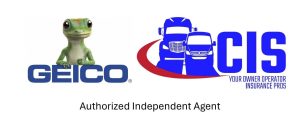Proven Tips to Save Money on Your New Motor Carrier Insurance
Are you a new trucker or expediter trying to figure out how to become a Motor Carrier?
If you’re starting from scratch, not sure where to start and feeling a little lost–Well you’re in the right place.
We hear these questions and more from new truckers every day
- How do I get a DOT number?
- Why do I need my Motor Carrier Authority?
- When should I get the Truck Insurance?
- How much insurance do I really need?
- What affects my premium?
- Why do I need to carry $1,000,000 in Liability?
- Why isn’t FMCSA showing my correct insurance limits?
Well time is money, and you don’t want to spin your wheels trying to piece all of this together on the fly.
That’s where we come in.
It doesn’t need to be so difficult, guys.
At CIS we’re Transportation Insurance Experts here to help make the whole Motor Carrier process much easier for you.
Keep reading to learn about the truck insurance you’ll need, and follow the simple steps to start your own Motor Carrier Authority!
First–Why Get Your Truck Insurance Quote Before Anything Else?
Truck insurance is one of the biggest expenses you’ll face as an independent trucker, so it’s smart to plan ahead.
Why spend $300 on your DOT and other start up expenses if you might not be able to afford the commercial truck insurance?
By getting a quote first, you’ll also connect with a Truck Insurance Pro – She can hold your hand through the entire process—for free—as you work toward getting your DOT Motor Carrier Authority:)
Buying a policy too early or too late is like throwing money away on something you’re not even using.
Timing is everything.
We’ll also be straight with you—if your insurance premium makes sense and allows for a solid profit we’ll let you know.
If so, THEN we’ll help you go through the Simple Steps on How to Get a Motor Carrier Authority.
From there, we help you focus on making a great living as an independent trucker—while we ride shotgun!
Who Decides How Much Insurance Motor Carriers Need?
FMCSA is the Federal Motor Carrier Safety Administration which oversees the Department of Transportation in the U.S.
If you’re moving freight across state lines with a Cargo Van, Sprinter, Hot Shot, Box Truck, or Semi, the FMCSA requires you to meet specific minimum insurance limits.
These are determined based on the unit’s weight and the type of freight carried.
What are FMCSA Insurance Requirements for Trucks & Commercial Vans?
- Commercial trucks over 10,001 GVW need at least $750,000 in liability coverage.
- If you drive a hot shot truck or a dually with a gooseneck trailer, you’ll also need a minimum of $750,000 in liability insurance. Learn more about Hot Shot Insurance.
- For cargo vans and sprinter vans hauling freight across state lines, the minimum liability requirement is $300,000. Check out more details on Cargo Van & Sprinter Insurance.
FMCSA Insurance Filing Requirements Chart
What Type of Liability Does a New Motor Carrier Need?
Primary Commercial Auto Liability is the coverage all truckers need to legally drive on the road.
This coverage insures you if you hit someone or something and cause Bodily Injury or Property Damage.
Primary Commercial Auto Liability covers you 24/7.
Activating your own Motor Carrier Authority means you’ll need to have Primary Commercial Auto Liability insurance in place.
Buying the wrong type of Liability insurance will not activate your Motor Carrier authority and you will have wasted time and money.
Check out Commercial Truck Liability Explained to learn more.
What Affects the Cost of your Truck Insurance Most?
Some states are just more expensive than others, but there are things you can do to lower your insurance premium. Focus on your credit, keep your current insurance in force, and maintain a clean driving record.
If you’re planning to become a Motor Carrier down the road, now’s the time to clean up any credit issues or late payments.
One easy tip? Set up your current insurance on EFT (electronic funds transfer).
This way, your payments are always on time, and your insurance provider sees you as financially reliable.
They won’t pull the funds until the specified date, so even if money’s tight, just make sure you have it in your account a few days before they withdraw.
It’s a smart move to keep things running smoothly now AND establish yourself as consistent and trustworthy in the future!
Insurance companies like to see at least 3 years of continuous coverage with limits of $100,000/$300,000 if you want to qualify for their preferred rates.
How Do I Start My Motor Carrier Authority?
The question is always the same—What comes first, the insurance, DOT, or MC?:)
- Start by getting a quote for insurance.
- Apply for your DOT number.
- Purchase your insurance and file your BOC-3.
- Your Motor Carrier Authority–MC number–get activated.
Why is Understanding the DOT Authority Steps Important?
Nobody wants to spend money on insurance (or anything else) until they absolutely have to, right?
If you’ve got plenty of cash to spare, this might not matter much to you.
But if you’re keeping an eye on your budget, it’s easy to put the cart before the horse when it comes to spending on your DOT.
That’s where your Transportation Insurance Specialist can help.
She’ll guide you through the set up process step by step, so you can feel confident as you work toward getting your own DOT Motor Carrier Authority.
Trying to figure it out on your own can lead to a lot of wasted time and frustration—like a classic chicken-and-egg scenario.
Let CIS help you get everything in order so you’re not spinning your wheels burning through cash.
Are There Any Simple Steps to Get Your DOT Motor Carrier Authority?
Yes, after you have your ducks in a row, here’s an easy to follow cheat sheet Simple Steps to Your Motor Carrier Authority courtesy of CIS.
We’ll also help you go through it by phone.
What Are Filings on a Motor Carrier Authority?
The 91X/MCS90 insurance proof and BOC-3 form are considered the legal filings that activate your MC–Motor Carrier Authority.
Once you’ve got your truck insurance and BOC-3 squared away, these forms are linked to your DOT number and sent electronically to the FMCSA.
This proves you are in compliance with their requirements to legally haul freight across state lines as a Motor Carrier.
Your official authority certificate will arrive in the mail about 2 weeks after your MC number shows up as active online with FMCSA.
There’s a limited time period to set up your insurance and BOC-3 to activate your authority which is another reason to connect with your CIS Agent from the very beginning of your venture.
The better you have your ducks in a row, the least money spent on insurance and time wasted not hauling freight.
Why Carry $1,000,000 Trucking Liability Instead of the Minimum FMCSA Limits?
These days, industry standards have shifted—$300,000 for Commercial Vans and $750,000 for Hot Shots and larger Trucks required by FMCSA just isn’t the norm anymore.
You can start your truck insurance policy at lower limits to get your authority active, but in most cases you’ll need to bump that liability limit up to $1,000,000 to actually start getting loads.
It’s better to know this ahead of time so you can plan your budget.
The timing of it all is key, and that’s where your Transportation Insurance Expert comes in.
She’ll help you figure out the right limits at the right time.
Where Will I see My FMCSA Proof of Insurance?
FMCSA uses the SAFER system to post company snapshots of all DOT Authorities nationwide, and post proof of minimum insurance under SAFER Licensing and Insurance.
You can easily look up any company with a DOT Authority history by entering their DOT number into the system—it’s that simple!
And remember that you do not need to hire anyone to set up your DOT Motor Carrier Authority or check details about your company on the FMCSA Safer platform.
At this point in your business, you’ve got all the info you need right at your fingertips. So why spend extra money just to have someone else look at the same screen?
Down the line, safety advisors might make sense, but for now, you’re good to go.
Why does FMCSA show your insurance as less than the $1,000,000 you purchased?
The FMCSA’s job is to protect the public from underinsured commercial truckers by enforcing the minimum required insurance limits.
That’s where the MCS90 comes in—it’s an endorsement on your policy that guarantees the public is protected for those minimum amounts.
- Commercial Vans under 10,001 GVW are required to carry $300,000 minimum coverage.
- Hot Shots and Trucks need $750,000 minimum coverage.
The 91X acts like a bond that promises the public that if your $1,000,000 insurance wasn’t active at the time of an accident, the MCS90 steps in as backup coverage at the lower legally required amounts of $300,000 or $750,000.
When you check out Safer Licensing and Insurance, you’ll see your insurance company’s promise to the public through your 91X Certification.
Simple as that!
That Explains Why Insurance Companies Require 35 Days’ Notice to Cancel Truck Insurance
By law, there’s a mandatory 35-day waiting period before an insurance company can officially cancel your policy.
This gives everyone a heads-up in case your insurance lapses.
To be clear, if you bought $1,000,000 in truck insurance and your policy is active, you’re covered up to that full amount when you make a claim.
The MCS-90 only comes into play if you don’t have insurance in place, and the courts should decide you were at fault with no insurance in place.
Want to learn more about how your 91X and MCS-90 requirements tie into your commercial truck insurance? Check it out here!
What Other Insurance Does a New Motor Carrier Need?
In addition to Commercial Auto Liability, Motor Carriers need to make sure the cargo they’re hauling is insured too.
While the FMCSA doesn’t set a minimum for cargo coverage, most trucks and commercial vans hauling general freight stick with the industry standard of a $100,000 limit for Motor Truck Cargo Insurance.
If you’re in the Hot Shot business, keep in mind that customers often want $250,000 in coverage. It makes sense—two or three cars can easily add up to more than $100,000.
Need a quick overview of what’s covered (and what’s not) under a standard motor truck cargo policy?
Check out Commercial Truck Cargo Insurance Explained.
Do you need Truckers General Liability Insurance?
More and more of your customers might ask you to carry something called Truckers General Liability Insurance.
Now, don’t confuse it with Commercial Auto Liability for Truckers—that’s the one that covers you while driving your truck.
General Liability, on the other hand, covers you for injuries or property damage you might cause when you’re not driving your truck.
This type of insurance isn’t required by the FMCSA, but brokers or customers might ask for it, so it’s good to be prepared that you may need to add this coverage later on.
The most common coverage limits customers look for are $1,000,000 per occurrence and $2,000,000 aggregate (that’s per year).
Want to know more? Truckers General Liability Explained breaks it all down, including why so many customers are requesting it alongside your Commercial Auto policy.
For a quick overview of all the coverage types we’ve mentioned, check out Commercial Truck Insurance Basics.
It’s simple, straightforward, and super helpful for newbies and established Motor Carriers alike!
How Can a new Motor Carrier get Affordable Truck Insurance?
Yes, affordable Motor Carrier Insurance is out there, but let’s be honest—if you’re a new startup Motor Carrier, the options are pretty limited.
Why? Because insurance companies covering truckers have been dealing with losses for years, and they’re cautious about who they work with.
That’s why getting the right help from the start is so important.
If you shop around too much and run a bunch of competitive quotes, you will very likely end up burning bridges and having no options at all.
Insurance companies aren’t big fans of seeing different scenarios for the same risk. It can come across as inconsistent and make you seem less trustworthy if you keep changing your answers. Yes, they keep track of this activity, let us help you get around that:)
Which Insurance Companies Cover New Motor Carriers?
For years, Progressive Commercial Truck Insurance has been the go to provider for new startup Motor Carriers.
While a few other small outliers have shown interest in new trucking startups, most have melted away after getting nailed with losses.
However, another established and well funded insurance contender has entered the marketplace for trucking.
GEICO has launched a nationwide trucking insurance program designed for small Motor Carriers.
Their premiums are super competitive for both new and established carriers, and they’re definitely giving Progressive a run for their money as the two keep battling it out with new rates.
CIS is an independent agent representing both Progressive and GEICO.
You can read more about GEICO Commercial Truck Insurance.

Where Does a New Motor Carrier find freight?
All the insurance savings in the world won’t help if you don’t have a steady supply of freight to haul.
Research where you will be getting your loads before you get your DOT.
If you have a few customers already that’s great, but typically new startups depend on a reliable loadboard to secure consistent freight.
For Cargo Vans, Sprinters and Straight Trucks we recommend the loadboard MyVirtualFleet.com.
Time is Money
…and the timing of your FMCSA application for DOT to insurance to MC authority to obtaining loads takes…TIME.
Do as much research as you can BEFORE you embark on your new Motor Carrier venture.
Talk to your CIS Trucking Pro from the beginning to ensure the fastest DOT process with minimal cost.
She knows all the questions and will guide you in preventing costly mistakes…and help you make new connections.
Give us a call at CIS (330) 864-1511
…We’d love to help you get started to success on the road to independence!
We are CIS, and We Make Your Truck Insurance Easy!
Authors
Shelly Benisch, CIC, TRS started Commercial Insurance Solutions, Inc. (CIS) in 2002 and brings over 30 years of experience in Commercial Truck Insurance. As one of the top 25 Progressive Truck Insurance Agency Leaders in 2024, she helps small Motor Carriers and Owner Operators across the country find affordable trucking insurance quotes with GEICO, Progressive and more. Shelly also writes a free Trucking Blog packed with insurance tips for all kinds of Small Carriers. Her team of Truck Insurance Experts have earned CIS consistent 5-star Google reviews and Progressive's Top 25 Truck Elite Status. For expert Commercial Truck Insurance advice, give Shelly a call at (330) 864-1511 #CISDoesThat Commercial Truck Insurance for owner operators and small motor carriers.
CEOChristina Cummings, TRS certified, leads Commercial Insurance Solutions, Inc. (CIS) as Executive Director and true experienced advice on Commercial Truck Insurance. She secures the most affordable GEICO quotes and Progressive quotes...and more for small Motor Carriers and Owner Operators nationwide. She is your "go to" person at CIS for advice with underwriting questions, tips and networking opportunities for Small Truckers. Under her leadership CIS earned Progressive's Top 25 Truck Elite status in 2024 and consistent 5-Star Google reviews. She also co-authors the free CIS Commercial Truck Insurance Blog for small Motor Carriers and Owner Operators, sharing her bottom line tips on how to find more affordable Commercial Truck Insurance. Looking for expert trucking insurance advice–Christina is your go to leader at (330) 864-1511 #CISDoesThat


